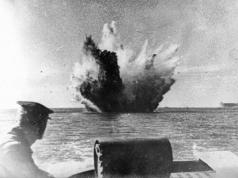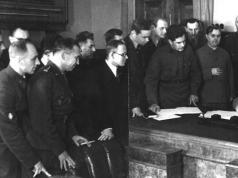One of the significant sources of unaccounted alcohol in the post-Soviet space is pharmacies. It is also a source of psychotropic drugs that can be bought without a prescription. According to pharmaceutical market research, from 2002 to the present day, alcohol-containing medicinal tinctures have been leaders in terms of pharmacy sales and profits. They are called "fufiriki".
 Nowadays, pharmacies sell numerous products freely, that is, without any prescription. alcohol-containing tinctures And narcotic drugs. Their main consumers are people suffering from alcoholism and at the same time low on funds.
Nowadays, pharmacies sell numerous products freely, that is, without any prescription. alcohol-containing tinctures And narcotic drugs. Their main consumers are people suffering from alcoholism and at the same time low on funds.
It is enough to mix the contents of several of these vials, say, with lemonade, and instead of a sedative, the result is a strong drink that is not inferior in its effect to a bottle of vodka. Therefore, there is always a demand for tinctures in pharmacies. Among the most popular brands- hawthorn tincture, capsicum tincture, calendula tincture. These tinctures can only be conditionally called drugs, because you will not find them anywhere in the world, only in post-Soviet pharmacies. These products are in high demand today. In terms of monetary value, these products occupy no more than one percent of the total pharmaceutical market. That is, these are quite cheap goods.

1. It's cheap alcohol. For example, 300 milliliters of hawthorn tincture, 70% consisting of ordinary alcohol, will cost only ten thousand rubles. That is, herbal tinctures are a common alcohol substitute. "If you count the amount of alcohol contained in a bottle of vodka (according to minimum price) and alcohol-containing tinctures, it turns out that buying alcohol today at a pharmacy is cheaper than in retail stores.

2. Fashionable mixtures. Advanced alcoholics mix stimulating and sedative tinctures, often diluted with soda.

3. Everyone drinks. Formic alcohol, for example, is taken in several bottles at a time. The ethanol concentration in it is 70%. By the way, this product is for external use, but is used internally. Tinctures of hawthorn and red pepper are also widely popular in pharmacy sales.
4. They sell around the clock. Tinctures are sold in pharmacies around the clock, without age restrictions.
Their impressive list contains several dozen items - all kinds of tinctures: hawthorn, St. John's wort, motherwort, calendula, peony, propolis, pepper, mint, valerian, plantain, lemongrass, eucalyptus, ginseng, eleutherococcus and many other herbs and their compositions.
4. Top sales in Belarus: hawthorn tincture, lamivitis, moscovy, valerian tincture.
 Psychotropics.
Psychotropics.
1. Phenobarbital preparations.
Corvalol, valocordin, barboval. Applicable only in post-Soviet countries. Habituation and dependence on phenobarbital can develop within 2-3 weeks of regular use. Phenobarbital is known to be a derivative of barbituric acid. It depresses the central nervous system and is a psychotropic substance that can cause addiction. It has the ability to accumulate; the substance is not excreted, but gradually accumulates in the body, which can lead to serious illnesses and even death. To date, Corvalol is banned in the USA, United Arab Emirates, Italy, Germany, Great Britain, Lithuania, Poland, Finland, Sweden and Norway. Therefore, when traveling to these countries, you should be aware that if customs detects this “miraculous” bottle in your possession, you risk going to jail for transporting prohibited psychotropic drugs.
2. Codeine preparations. Codterpin, Tercodin, Terpincode
In order to limit the retail trade of alcohol-containing non-food products, their circulation has been suspended, the moratorium was introduced by a decree of the chief sanitary doctor, Rospotrebnadzor reports in a letter addressed to regional departments marked “very urgently” (the document was published on December 26 on the department’s website, the decree came into force on Monday, 26 December).
In the Irkutsk region, a state of emergency has been introduced due to mass poisoning with a bath concentrate "Hawthorn" containing a poisonous substance. methyl alcohol, which was added to the product instead of ethyl. According to the latest data, 76 people became victims of poisoning; a criminal case has been opened, in which 23 people have already been detained.
One of them is the deputy head of the regional department, suspected of negligence. Four suspects were arrested on Monday by the Leninsky District Court of Irkutsk.
The moratorium announced by Rospotrebnadzor was introduced on December 26 for 30 days and orders entrepreneurs to suspend trade in non-food products whose alcohol content exceeds 25%, with the exception of perfumes and windshield washer fluids.
The heads of the regional departments of Rospotrebnadzor and the railway transport departments were ordered to strengthen control over both food and non-food alcohol-containing products, increase the coverage of laboratory control, “particularly paying attention to the detection of toxic impurities.” The results are required to be reported on a daily basis.
Violators face administrative liability for the illegal sale of goods, the free sale of which is prohibited (fine for citizens - from 1.5 thousand to 2 thousand rubles, for legal entities- from 30 thousand to 40 thousand rubles, with or without confiscation).
"It's only about cosmetics. Medicines and any tinctures medical purposes this does not apply,” Rospotrebnadzor assured Gazeta.Ru.
This will definitely not affect pharmacies, echoes Elena, executive director of the non-profit partnership “Pharmacy Guild”: “The fact is that tinctures are registered as medicines, and Rospotrebnadzor does not even have the authority to limit them, because the procedure and rules (sales) are determined only.”
The Ministry of Health, according to her, established back in 2010 that all medications containing potent substances should be dispensed in no more than two packages per person. “And since ethanol is a drug subject to quantitative accounting, this requirement also applied to tinctures,” she explains.
Cosmetics containing a high percentage of alcohol are, as a rule, not sold in pharmacies, Nevolina added. “Reputable pharmacies, of which we have the majority, as a rule, do not take these liquids, since such sales only cause reputational damage,” she assured.
Deputy Prime Minister Alexander Khloponin last week made a proposal to sell alcohol-containing medications, such as the heart medications Valocordin and Corvalol, and Hawthorn tincture, by prescription. The Minister of Health said that this issue has not yet been resolved in the ministry, but other measures have been developed to curb the misuse of alcohol-containing drugs.
In some Moscow pharmacies, according to Gazeta.Ru, after the announcement, there was an increased demand for Valocordin: pensioners bought the medicine in large quantities in reserve. Director Russian Association pharmacy chains (RAAS) announced last week that the transfer of medicinal alcohol-containing products to prescription can lead to excessive demand, shortages and lead to additional burden on clinics.
What has changed in normative legal acts for December 2016 and January 2017
The main documents of January 2017 are the Rules of Good Pharmacy Practice registered by the Ministry of Justice, as well as the Rules for the storage and transportation of medicines. Starting March 1, pharmacy employees will refer to these voluminous orders almost every day. Other new products for 2017 include changing the requirements for the sale of alcohol-containing drugs in pharmacies and updating inspection tools: the Ministry of Health announced a bill that will give Roszdravnadzor the authority to carry out test purchases medicines.
Our expert
Elena Nevolina
Executive Director Non-profit partnership"Pharmacy Guild" (Moscow)
The most important order
On the first working day of 2017, the Ministry of Justice registered the most important document for the pharmacy industry - Order of the Ministry of Health of Russia No. 647n “On approval of the Rules for Good Pharmacy Practice of Medicines for Medical Use.” Detailed review document you can find here.
The rules come into force on March 1. One of the developers of the document is Elena Nevolina, executive director of the National Pharmaceutical Chamber and Association “Pharmacy Guild”. According to her, the document should significantly simplify the life of managers of pharmacy institutions, since it contains all the main nuances of the work of a pharmaceutical retail organization.
The rules have been developed over four years (since 2012). They were based on an analysis of inspection reports of pharmacies by various control organizations.
Therefore, the order reflects all the basic existing requirements for pharmacies. In addition, when studying inspection reports, Elena Nevolina noticed that inspectors often paid attention to details that were not recorded in regulations, but were still important for maintaining the quality of the service for the dispensing and sale of medicines. Such points are also reflected in the rules.
A webinar dedicated to Good Pharmacy Practice, with the participation of Elena Nevolina and Irina Krupnova, Head of the Department of Licensing and Monitoring Compliance with Mandatory Requirements of Roszdravnadzor, will take place at the Katren-Style site on March 15.
Store and transport
On the same day, January 9, the Ministry of Justice registered another fateful document for the industry - Order of the Ministry of Health of Russia No. 646n “On approval of the Rules of Good Practice for the Storage and Transportation of Medicines for Medical Use.” These rules apply to manufacturers, distributors, pharmacies and medical institutions that store and dispense medications.
The document also comes into force on March 1, 2017. It’s better to study it in advance, notes Elena Nevolina. The point is, she points out, that new Order intersects with the already existing Order of the Ministry of Health No. 706n “On approval of storage rules medicines", which is also mandatory.
The new pharmacopoeia also determines the storage conditions for drugs, she emphasizes. When comparing all these documents from employees pharmacy organization Questions may arise and it is better to contact Roszdravnadzor for clarification in advance, Ms. Nevolina summarizes.
Small bottles
When selling tinctures and other types of alcohol-containing drugs, manufacturers were required to bottle these drugs in smaller containers. The corresponding Order of the Ministry of Health No. 979n dated December 21, 2016 “On approval of requirements for the volume of containers, packaging and completeness of medicines for medical purposes” came into force on January 22.
Despite the good goal - the fight against alcoholism - limiting the volume of containers of alcohol-containing medicines affects a very narrow segment of goods. In addition, the dispensing rate for such drugs has not changed in any way, so drinkers can now easily purchase two bottles instead of one.
Test purchases
The inspection methodology is likely to change this year. On January 19, the Ministry of Health announced a bill that would give Roszdravnadzor the authority to carry out control purchases of medicines. The document is expected to come into force in June 2017. Previously, departments did not have such powers, with the exception of operational activities of security forces. However, as pharmacy employees say, they have heard the term “control purchase” from inspectors more than once before.
December 2016
The last month of the leap year 2016 brought with it two projects clarifying the rules of public procurement. Now these documents are in mandatory necessary for study by representatives of municipal unitary enterprises and state unitary enterprises. But most people will remember December of the past year, of course, not for this, but for the mass poisoning with a bath concentrate under the pharmacy name “Hawthorn”.
Corvalol began to be dispensed in two bottles per hand
Afterwards, Dmitry Medvedev supported the proposal of the head of Rospotrebnadzor Anna Popova “for starters” to ban the sale of non-food products with an alcohol content of over 25 degrees for up to 30 days. An exception will be made only for perfume and windshield cleaners, but many medicinal tinctures will be banned.
While the government is preparing systemic measures aimed at streamlining the circulation of alcohol-containing liquids in general, it has been decided to take emergency measures. Since the word “Hawthorn” is so closely associated with alcohol tinctures, they will be the first to be distributed. The alcohol content in this type of product is approximately 70%.
“This means that tinctures of hawthorn, motherwort, valerian, peony, as well as Corvalol, Valocordin, and drops will be banned,” says Elena Nevolina, head of the Pharmacy Guild NP. - In this regard, the only phrase that comes to my mind is from the joke about Vovochka: “Where is the logic?” People have been poisoned by cosmetics, and the sale of medicines is prohibited. That's what's unclear. People drank bath liquid. Why are old people deprived of cheap drugs that make their lives much easier?
It is the elderly population that really loves drops: they are the most affordable sedative for them - everything else costs more, even motherwort in tablets. And valerian in tablets, as the grandmothers themselves say, may help someone, but an alcohol tincture is much more effective. After all, alcohol is absorbed faster.
All old women consider Corvalol and Valocordin to be heart drops - they drip them and calm down. And now they will need to go to the doctor. Of course, both Corvalol and Valocordin contain a barbiturate, but it is there in such a dosage that phenobarbital cannot be extracted from it. And grandma sleeps well from the effects of the drops - and thank God. Young people do not take these medications. However, I don’t think that the demand for these tinctures will sharply increase now - these products do not have an audience that has the money to buy for future use.”
In the meantime, information has already appeared that some Moscow pharmacies have decided, on their own initiative, to out of harm’s way limit the sale of alcohol-containing medications. Some people don’t give more than two bottles in their hands.
Let us recall that earlier the Minister of Health Veronika Skvortsova promised that they would not withdraw alcohol-containing medications from pharmacies. However, it cannot be ruled out that they will begin to be sold by prescription.








